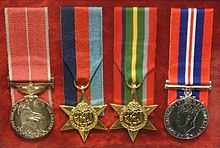Not to be confused with William Chong Wong.
| An editor has performed a search and found that sufficient sources exist to establish the subject's notability. Please help improve this article by adding citations to reliable sources. Unsourced material may be challenged and removed. Find sources: "Bill Chong" – news · newspapers · books · scholar · JSTOR (June 2024) (Learn how and when to remove this message) |
| Bill Chong | |
|---|---|
 Chong in 1943 Chong in 1943 | |
| Native name | 鄭根 |
| Birth name | William Gun Chong |
| Nickname(s) | Agent 50 |
| Born | (1911-07-15)July 15, 1911 Vancouver, Dominion of Canada |
| Died | October 18, 2006(2006-10-18) (aged 95) Vancouver, Canada |
| Allegiance | |
William Gun Chong BEM (Chinese: 鄭根; 1911–2006) was a Canadian spy who served in the British Military Intelligence unit MI9 during World War II. He is the only Chinese Canadian to be awarded the British Empire Medal, the highest honor that Britain awards to non-British citizens.

Life
Chong was born in Vancouver on July 15, 1911. He had little formal education and was employed as a cook and houseboy.
Chong was visiting Hong Kong when Japan invaded in 1941. He escaped to free China where he joined the British Army Aid Group, a paramilitary unit of MI9. Chong then was a British spy, known as Agent 50, who operated behind Japanese lines in occupied China. After the war Chong returned to Canada and operated a cafe on Vancouver Island.
Wartime experiences
Chong travelled back and forth between free and Japanese-occupied areas of China. Chong's main tasks were to smuggle medical supplies into the occupied area, and smuggle people and intelligence out. He dressed as a beggar and always travelled on foot, often walking 30 miles (48.3 km) per day. His walking cane hid medicines and documents.
The people Chong smuggled were British and Commonwealth subjects and stranded Allied aviators. Chong did not recognize two of his charges as the chief justice and prosecutor of Hong Kong, until after the war when he was called as a witness in a trial of a collaborator.
Chong was captured by the Japanese and escaped twice. One time he escaped from the hold of a fishing boat. The other time he escaped immediately before execution when his compatriot spoke in Japanese and displayed the business card of a Japanese officer.
References
- Vancouver Asian Heritage Monthly Society. "Chinese History in Canada". The Virtual Museum of Asian Canadian Cultural Heritage. Retrieved November 19, 2017.
- "Noteworthy historical figures - Asian Heritage Month". Asian Heritage Month 2017. Government of Canada. Retrieved November 19, 2017.
- ^ Clement, Catherine (December 8, 2016). "The Incredible WW2 Story Of Intrepid Espionage Agent Bill Chong: Agent 50". War History Online. Retrieved November 19, 2017.
- Mickleburgh, Rod (August 11, 2005). "How a valiant spy tricked his captors". The Globe and Mail. Retrieved September 4, 2017.
- ^ Chong, Bill. "Bill Chong". Heroes Remember -- Chinese-Canadian Veterans (Interview). Veterans Affairs Canada. Retrieved December 4, 2018.